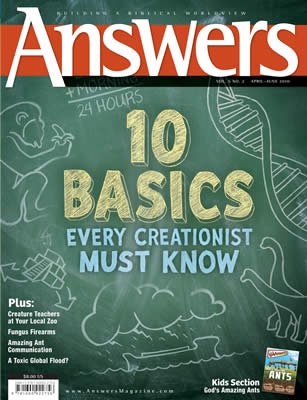Six Literal Days
In the context, the word day in Genesis 1 refers to six 24-hour days. Every time it appears with “evening and morning” or with a number like “sixth day,” it refers to a 24-hour day.
Did God create the whole universe, including the original plants, animals, and first two people (Adam and Eve) in six literal 24-hour days? Or did creation take place over millions of years?
To answer that, we should remember that the original readers of Genesis were not scientists or Hebrew scholars. Rather, they were former slaves—mostly uneducated— on their way to the Promised Land. The fathers were commanded to teach their children (Deuteronomy 6:1–7), so the Hebrew language in Genesis 1 must have been very clear to the common people, even to children.
When we look carefully at Genesis 1, in Hebrew or even in English, it is clear that God created everything in six literal (24-hour) days. First, we are told that He created the earth in darkness and then created light. Then He called the light “day” and He called the darkness “night.” And then He said (in the original Hebrew) “and [there] was evening and [there] was morning, one day.” He repeated the same statement at the end of the second day through the sixth day.
So the evening and the morning were the sixth day.
Everywhere else in the Old Testament, when the Hebrew word for “day” (יוםֹ, yom) appears with “evening” or “morning” or is modified by a number (e.g., “sixth day” or “five days”), it always means a 24-hour day.
On Day Four God further showed that these were literal days by telling us the purpose for which He created the sun, moon, and stars—so we could tell time: literal years, literal seasons, and literal days.
Then in Exodus 20:8–11 God commanded the Israelites to work six literal “days” and rest on the seventh because He created in six “days” (using the same Hebrew word).
Furthermore, Jesus and the New Testament apostles read Genesis 1–11 as straightforward historical narrative. There are additional good scholarly reasons for coming to that conclusion.1
There is no biblical or scientific reason to be ashamed of believing in a recent six-day creation. God has spoken clearly and truthfully. Will you trust His Word over the arrogant claims of sinful men?
Answers Magazine
April – June 2010
Debates about evolution and attacks on Scripture seem endless. But why should we be ashamed of truth? In this issue you’ll find basic truths revealed in Genesis and confirmed by science—bare-bones essentials that all Christians need. Also look for fascinating science news, ideas for a faith-building creation “stay-cation” to your local zoo, and semi-technical articles to strengthen your faith and challenge your mind!
Browse IssueFootnotes
- See Terry Mortenson and Thane H. Ury, eds., Coming to Grips with Genesis (Green Forest, Arkansas: Master Books, 2008).

Answers in Genesis is an apologetics ministry, dedicated to helping Christians defend their faith and proclaim the good news of Jesus Christ.
- Customer Service 800.778.3390
- Available Monday–Friday | 9 AM–5 PM ET
- © 2025 Answers in Genesis



